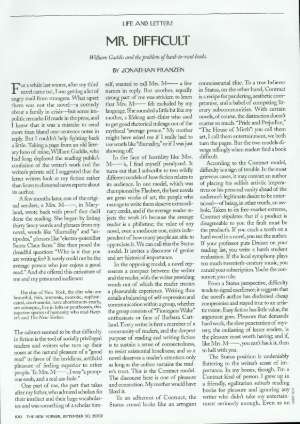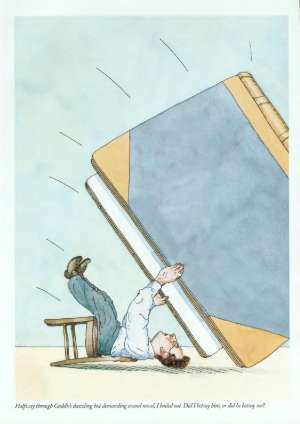The New Yorker, September 30, 2002 P. 100
LIFE AND LETTERS about "difficult" writing and novelist William Gaddis... ... Writer tells about a fan letter he received which harshly criticized his broad use of vocabulary....Her subtext seemed to be that difficulty in fiction is the tool of socially privileged readers and writers who turn up their noses at the natural pleasure of a "good read" in favor of the invidious, artificial pleasure of feeling superior to other people. In the opposing model, a novel represents a compact between the writer and the reader, with the writer providing words out of which the reader creates a pleasurable experience. Every writer is first a member of a community of readers, and the deepest purpose of reading and writing fiction is to sustain a sense of connectedness, to resist existential loneliness; and so a novel deserves a reader’s attention only as long as the author sustains the reader’s trust. This is the Contract model... Gaddis, it was generally agreed, was the really smart, really angry, really forbidding Systems writer. If Coover’s "The Public Burning" and Pynchon’s "The Crying of Lot 49" moved me, it was mainly because I loved Coover’s character Richard Nixon and Pynchon’s Oedipa Maas. But postmodern fiction wasn’t supposed to be about sympathetic characters... A few years after I conquered "The Recognitions," I started Gaddis’s second novel, "J R" “J R" is a seven-hundred-and-twenty-six-page novel consisting almost entirely of overheard voices, with nary a quotation mark, no conventional narration of any kind, no "later that same evening," no "meanwhile in New York," not a single chapter break, not even a section break, but thousands of dashes and ellipses, another cast of dozens, and a laughably complicated plot based on Wagner’s Ring and centered on a multimillion-dollar business empire owned and operated by an eleven-year-old Long Island schoolboy named J R Vansant... One defense of Gaddis and his difficulty is that conventional fiction, driven by substantial characters and based on a soul-to-soul Contract between reader and writer, was simply inadequate to the social and technological crises that twentieth-century writers saw developing all around them... Mentions a report that he himself did not like difficult fiction of the sort he wrote... I know the pleasures of a book aren’t always easy. I expect to work; I want to work. It’s also in my Protestant nature, however, to expect some reward for this work. And, although critics can give me pastoral guidance as I seek this reward, ultimately I think each individual is alone with his or her conscience. As a reader, I seek a direct personal relationship with art. The books I love, the books on which my faith in literature rests, are the ones with which I can have this kind of relationship. "The Recognitions," to my surprise, turned out to be a book like this...

